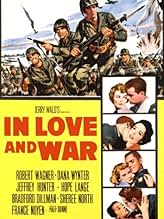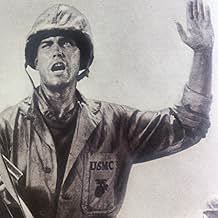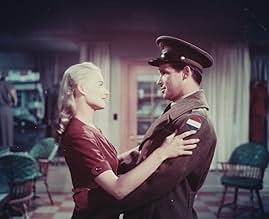IMDb RATING
6.1/10
534
YOUR RATING
In 1944, the family lives of three San Francisco Marines are affected by their personal experiences on the front lines in the Pacific and at home.In 1944, the family lives of three San Francisco Marines are affected by their personal experiences on the front lines in the Pacific and at home.In 1944, the family lives of three San Francisco Marines are affected by their personal experiences on the front lines in the Pacific and at home.
- Awards
- 1 win total
Edit Angold
- Maid
- (uncredited)
Edith Barrett
- Mrs. Lenaine
- (uncredited)
James Bell
- Sidney Lenaine
- (uncredited)
Barry Bernard
- Hotel Clerk
- (uncredited)
Barry Brown
- Minor Role
- (uncredited)
- Director
- Writers
- All cast & crew
- Production, box office & more at IMDbPro
Featured reviews
Enjoyable , agreeable movie depicting lives of three Marines in San Francisco during World War II. Frankie O'Neill (Robert Wagner) visits his poor and troublesome family ; Nico Kantaylis (Jeffrey Hunter) learns his lovely , pure-hearted girlfriend (Hope Lange) is pregnant ; and the upper-class Alan Newcombe visits his father and high-living , socialite girlfriend (Dana Wynter) . Soon after , O'Neill drowns his troubles in alcohol and along with a friend Lorraine (Sheree North) , losing the respect of his potential lover ; Kantaylis marries his fiancée ; while Alan leaves his socialite and drunk girlfriend for a Hawaiian nurse , Kalai (France Nuyen) . The coming battle results to be a dangerous and nearly impossible assignment in a strongly armed Japanese position at an isolated island . Love-Hungry Youth amid the fires of war. THE ONE TRULY GREAT STORY OF THE U. S. MARINES!
This dramatic film in Soap Opera style dealing with unresolved love stories , concerning the family lives of three San Francisco Marines affected by their personal experiences on the front lines in the Pacific and vice-versa, along the way , each must decide whether to make the best of his situation or break out of it . Marines life is narrated aboard a ship , en route through Pacific , by means of flashbacks , in with they reminisce about their love stories , including a dramatisation of the landings and battles in which heroic acts cost some of the Marines their lives . The movie utilizes an often-used plot of the war movie genre which has soldiers in love with the women , whose romances are broken due to WWII, while remembering their lives in flashbacks . Impressive and breathtaking final scenes when there takes place Japanese island invasion , including landing crafts , tanks , explosions and and fierce battles . The ending images and survival of some protagonists will determine the surprising denouement in which one comes together to her . Quartet protagonists are pretty good , Robert Wagner gives a restrained interpretation as a Marine who hides his lower-class dysfunctional family , Bradford Dillman as the enamored upper-class soldier who falls deeply with the beauteous France Nuyen and Jeffrey Hunter is nice as the upright and brave Sergeant . Support cast is frankly well , such as Sheree North , Mort Sahl, Harvey Stephens , James Best , Barry Brown and the little girl Veronica Cartwright , future passenger of Alien film.
It contains sensitive and evocative musical score by Hugo Friedhofer. Colorful cinematography in Technicolor by the splendid director of photography Leo Tover . Shot on location in California , the naval scenes were filmed at the former Long Beach Naval Shipyard at Terminal Island California, Monterey, Stanford University, Palo Alto, California, Oakland, California, and at the Fox Studio back-lot . The motion picture was professional but slowly directed by Philip Dunne . He was an expert writer , getting some successes , such as Anne of the Indians , Sinuhé, the Egyptian , The Robe , Martin the Gaucho , Pinky , David and Betsabe , The Ghost and Mrs Muir , Demetrius and the Gladiators , Lydia Bailey . And he directed some movies as Blindfold , El inspector , Wild in the Country , 10, calle Frederick , Three Brave Men , Hilda Crane , The view from Pompey's Head.
This dramatic film in Soap Opera style dealing with unresolved love stories , concerning the family lives of three San Francisco Marines affected by their personal experiences on the front lines in the Pacific and vice-versa, along the way , each must decide whether to make the best of his situation or break out of it . Marines life is narrated aboard a ship , en route through Pacific , by means of flashbacks , in with they reminisce about their love stories , including a dramatisation of the landings and battles in which heroic acts cost some of the Marines their lives . The movie utilizes an often-used plot of the war movie genre which has soldiers in love with the women , whose romances are broken due to WWII, while remembering their lives in flashbacks . Impressive and breathtaking final scenes when there takes place Japanese island invasion , including landing crafts , tanks , explosions and and fierce battles . The ending images and survival of some protagonists will determine the surprising denouement in which one comes together to her . Quartet protagonists are pretty good , Robert Wagner gives a restrained interpretation as a Marine who hides his lower-class dysfunctional family , Bradford Dillman as the enamored upper-class soldier who falls deeply with the beauteous France Nuyen and Jeffrey Hunter is nice as the upright and brave Sergeant . Support cast is frankly well , such as Sheree North , Mort Sahl, Harvey Stephens , James Best , Barry Brown and the little girl Veronica Cartwright , future passenger of Alien film.
It contains sensitive and evocative musical score by Hugo Friedhofer. Colorful cinematography in Technicolor by the splendid director of photography Leo Tover . Shot on location in California , the naval scenes were filmed at the former Long Beach Naval Shipyard at Terminal Island California, Monterey, Stanford University, Palo Alto, California, Oakland, California, and at the Fox Studio back-lot . The motion picture was professional but slowly directed by Philip Dunne . He was an expert writer , getting some successes , such as Anne of the Indians , Sinuhé, the Egyptian , The Robe , Martin the Gaucho , Pinky , David and Betsabe , The Ghost and Mrs Muir , Demetrius and the Gladiators , Lydia Bailey . And he directed some movies as Blindfold , El inspector , Wild in the Country , 10, calle Frederick , Three Brave Men , Hilda Crane , The view from Pompey's Head.
The story follows three marines, and their girls, from home leave to combat in the Pacific.
The movie's very much a mixed package. With a couple exceptions, war films of the 1950's shied away from combat realism, whose trauma might easily overwhelm audiences. The second half of this war film does a pretty good job portraying the so-called fog of war, along with perfectly natural emotional and physical reactions to combat death. These scenes are done on exterior sets and are uglified to maximal extent. Such grim scenes are then intercut with sunny scenes in San Francisco, done in glowing candy box colors. The resulting contrast is appropriately jolting, to say the least, and leaves no doubt that between "love" and "war", which is to be preferred.
The trouble lies with a swollen narrative that is too conventional in the "Love" part. It also shows what happens when a big studio, TCF, decides to promote a younger cast into possible stardom. Everybody—about the top seven in the cast list—gets cameo screen time, in the film's first half, especially. This draws out the runtime, and coupled with a conventional script, tends to drag out the first part, long after we've gotten the idea. The actors perform well enough, though O'Neill's (Wagner) drunken binge is over the top, maybe the only time in the actor's generally restrained career. Note, in passing, the post-war symbolism of pairing Newcombe (Dillman) with Kalai (Nuyen).
All in all, the movie's a good look at how Hollywood shaped WWII to commercial needs of the big screen. But is otherwise forgettable.
The movie's very much a mixed package. With a couple exceptions, war films of the 1950's shied away from combat realism, whose trauma might easily overwhelm audiences. The second half of this war film does a pretty good job portraying the so-called fog of war, along with perfectly natural emotional and physical reactions to combat death. These scenes are done on exterior sets and are uglified to maximal extent. Such grim scenes are then intercut with sunny scenes in San Francisco, done in glowing candy box colors. The resulting contrast is appropriately jolting, to say the least, and leaves no doubt that between "love" and "war", which is to be preferred.
The trouble lies with a swollen narrative that is too conventional in the "Love" part. It also shows what happens when a big studio, TCF, decides to promote a younger cast into possible stardom. Everybody—about the top seven in the cast list—gets cameo screen time, in the film's first half, especially. This draws out the runtime, and coupled with a conventional script, tends to drag out the first part, long after we've gotten the idea. The actors perform well enough, though O'Neill's (Wagner) drunken binge is over the top, maybe the only time in the actor's generally restrained career. Note, in passing, the post-war symbolism of pairing Newcombe (Dillman) with Kalai (Nuyen).
All in all, the movie's a good look at how Hollywood shaped WWII to commercial needs of the big screen. But is otherwise forgettable.
I'm easily bothered by films that are set during a certain decade (and now century) with costuming, design, styling, etc., that don't match the period portrayed. If you pay close enough attention, there's very little that's 1940s about this film in its depiction. That being said, it actually was more satisfying than I anticipated.
The first act of this two-act film is clunky in nature. I agree with the reviewer who wrote that Wagner's portrayal of intoxication is well over the top and therefore, at least to me, unconvincing, but there's moments in the second act in which he shows his acting chops. Dillman unsurprisingly does not disappoint, and Hunter delivers a pleasing surprise.
This movie tends to vacillate between hokey, soap-opera elements and cerebral, emotionally intense components. Once you get past the obvious on-set shooting typical of the '50s and the forcing of "topical" issues, such as unwed pregnancy, interracial relationships, and philosophical objection to war, there's a final product that's actually touching.
I'm truly surprised I liked it.
The first act of this two-act film is clunky in nature. I agree with the reviewer who wrote that Wagner's portrayal of intoxication is well over the top and therefore, at least to me, unconvincing, but there's moments in the second act in which he shows his acting chops. Dillman unsurprisingly does not disappoint, and Hunter delivers a pleasing surprise.
This movie tends to vacillate between hokey, soap-opera elements and cerebral, emotionally intense components. Once you get past the obvious on-set shooting typical of the '50s and the forcing of "topical" issues, such as unwed pregnancy, interracial relationships, and philosophical objection to war, there's a final product that's actually touching.
I'm truly surprised I liked it.
There are many familiar faces in this one, from their younger days: Robert Wagner, Bradford Dillman, Jeffrey Hunter, Hope Lange, Dana Wynter and Sheree North. They're all affected by the war, as well as their own personal lives, which aren't always a pretty picture. There are some realistic battle scenes, as well as family conflict, alcoholism, love vs. Duty, as three servicemen, their families, and the women in their lives all interconnect.
Some scenes stay with you, like the enemy tank relentlessly forging ahead that needed to be destroyed, the enemy soldier begging for a drink of water, the self-destructive socialite whose wild ways caught up with her, and an adorable little boy who'll never see his father. There's drama without the melodrama.
Worth checking out!
Some scenes stay with you, like the enemy tank relentlessly forging ahead that needed to be destroyed, the enemy soldier begging for a drink of water, the self-destructive socialite whose wild ways caught up with her, and an adorable little boy who'll never see his father. There's drama without the melodrama.
Worth checking out!
Anton Myrer's novel, "The Big War," was published in 1957 with some degree of success and, not surprisingly, 20th Century-Fox bought the film rights. After all, World War II movies were a staple of this time and Myrer's novel provided a number of parts for those rising young performers then being groomed by 20th. The novel's three central Marine characters remained in Edward Anhalt's screenplay but their backgrounds were simplified, various supporting characters were eliminated, and the background for the domestic scenes shifted from the East Coast to California. Robert Wagner's back-story remains truest to the book. He has a doting mother and adoring younger siblings but fights with his hateful step-father. Bradford Dillman plays the rich, college-educated Marine and the movie sketches in his background but now gives him a drunken socialite of a fiancée, Dana Wynter, who's largely a screenwriter's invention. (His new girlfriend, France Nuyen, seems to have been inspired by another, unrelated character in the book.) Dillman's fate has also been re-written from Myrer's version. Jeffrey Hunter plays the conscientious Marine with the pregnant wife but his strained relationship with his mother-in-law goes unmentioned in the movie. (He does, however, get a bare-chest scene.) The second half of the movie shifts from homefront scenes in California to battle scenes in the Pacific. These scenes are done in a perfunctory style -- laced with occasional footage from actual World War II photographers -- and the actors' identities sometimes blur in those similar uniforms and under those metallic helmets. The result of all this is a glossy, mildly entertaining, but unmemorable movie which never rises above the "B" level of its "B" level performers. (Acting honors, such as they are, go to Sheree North as a practical-minded WAC.)
Did you know
- TriviaFilm debut of Veronica Cartwright.
- GoofsAlthough the film is set during the final days of World War II, which ended in 1945, outside the San Francisco hotel where Jeffrey Hunter and Hope Lange spend their honeymoon are parked, among other vehicles, a 1954 Ford and a 1952 Plymouth; CinemaScope panoramas of San Francisco streets, and the San Francisco skyline are all contemporary 1958 views.
- ConnectionsReferenced in What's My Line?: Robert Wagner (2) (1958)
- How long is In Love and War?Powered by Alexa
Details
- Release date
- Country of origin
- Language
- Also known as
- In Love and War
- Filming locations
- Production companies
- See more company credits at IMDbPro
Box office
- Budget
- $1,590,000 (estimated)
- Runtime1 hour 51 minutes
- Aspect ratio
- 2.35 : 1
Contribute to this page
Suggest an edit or add missing content





































